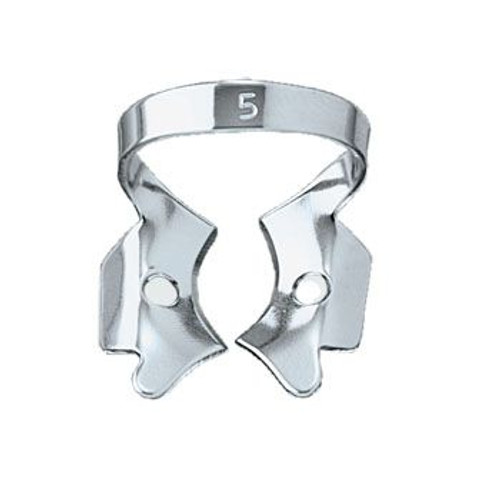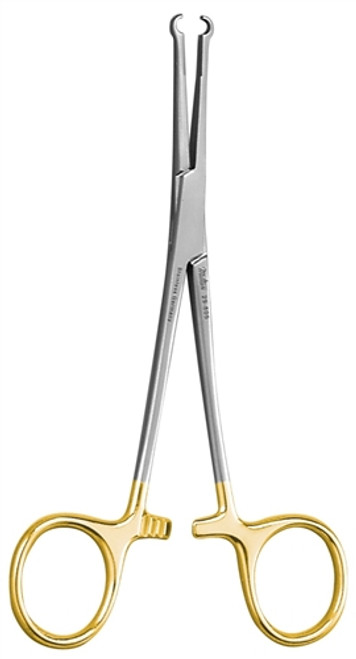Gomco Circumcision Clamp is used for circumcision procedures in newborns and infants. These chrome-plated circumcision clamps are designed to permit a single physician to perform circumcision quickly and usually without the need for sutures. Designed for fast interchange of plates and studs for different glans diameters.
Circumcision procedure
(Gomco Clamp method)
PATIENT CARE MAGAZINE, March 15, 1978, pp. 82-85. The following directions are provided for conduct of circumcision operations with the GOMCO clamp: The Gomco Technique. 1. Stretch the preputial opening 2. Break preputial adhesions [synechial membrane] so that the foreskin is completely retractile. [Fig. A above.] 3. Retract the foreskin until you can see the corona. Check the glans for any hidden adhesions. 4. Apply a small amount of lubricant such as K-Y Jelly to the glans so it won't stick to the inside of the bell. 5. Apply the bell-shaped plunger over the glans. [Fig. B above.] The bell should fit easily over the glans so they cover the corona. Too small a bell may injure the glans and fail to protect the corona. If stretching the preputial opening does not allow the bell to be inserted in the preputial space and entirely cover the glans, a dorsal slit may be necessary. 6. Pull the prepuce over the bell. [Fig. C above.] The foreskin should not be stretched or pulled too snugly over the bell. If it's pulled up too tightly, it's possible to remove too much shaft skin or to pull the urethra up so you get a tangential cut through the urethra as well as the skin. 7. Judge the amount of the shaft skin left below the corona; the skin should be relaxed and supple. 8. After you're sure of the dimensions, apply the plate of the clamp at the level of the corona. [Fig. D above] 9. With everything in proper alignment, tighten the clamp. This squeezes the prepuce between the bell and the clamp to make it blood-free. Be sure the weight of the clamp doesn't distort the anatomy so there isn't a proper amount of skin in the clamp. 10. Make a circumferential incision with a cold knife, not an electrosurgical instrument. [Fig. E above] 11. Leave the clamp in place at least five minutes to allow clotting and coagulation to occur. 12. Remove the clamp and apply antiseptic ointment (Betadine) to the crush line. Apply a light dressing or loin cloth arrangement to keep the ointment from rubbing off. 13. If you remove the clamp prematurely, the crushed edges may separate and bleeding will occur. When this occurs, suture the mucocutaneous margin, being careful to avoid deep sutures that might penetrate the urethra. If the whole edge separates, treat as a freehand circumcision, placing quadrant sutures and sewing between them with fine stitches. 14. Have the baby watched overnight for any signs of bleeding. 15. If late separation occurs, it's best to keep the wound clean and let it heal secondarily rather than try to suture it and risk development of stricture or fistula. Skin of this area tends to re-epethelialize rapidly. PATIENT CARE MAGAZINE, March 15, 1978, pp. 82-85.











